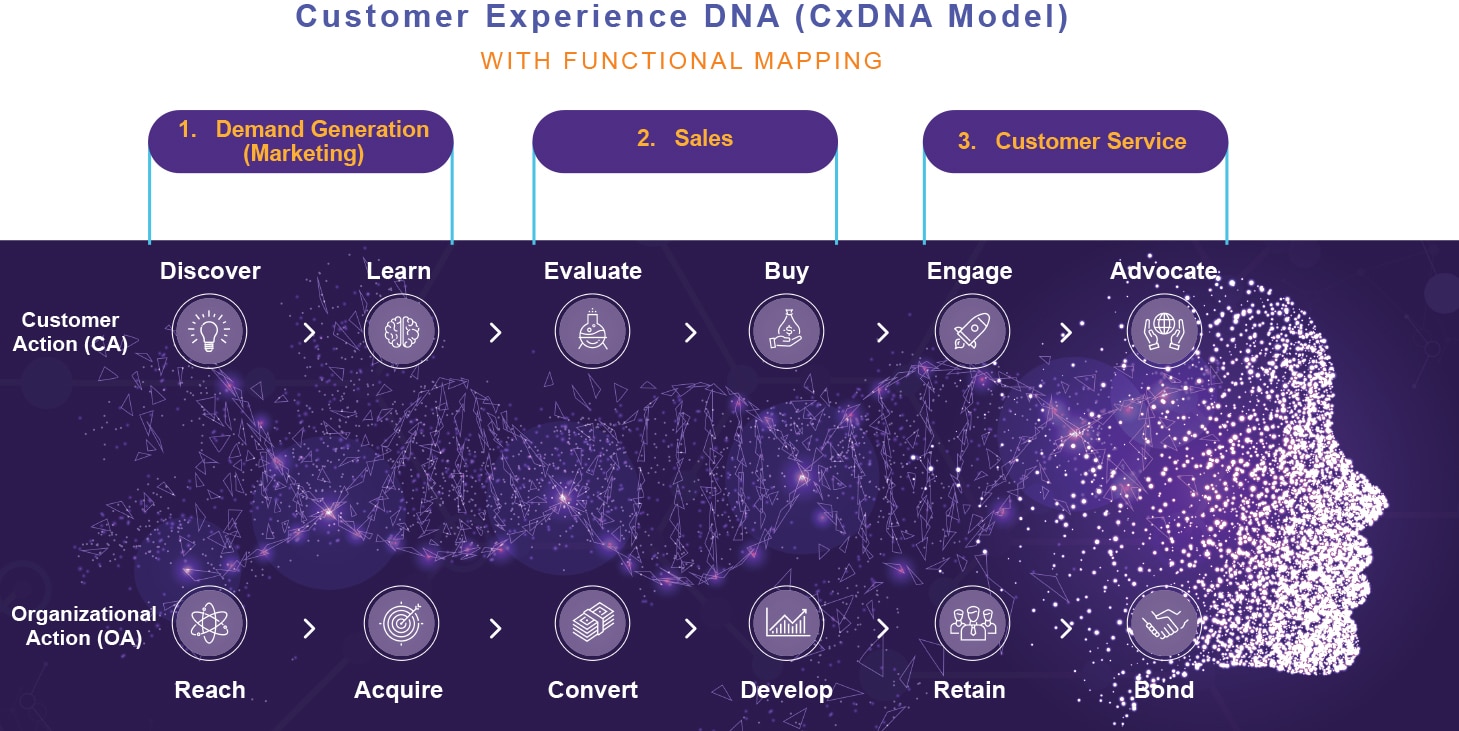Applications of AI in Marketing and Customer Experience Management
Identify use cases in Marketing, Sales and Customer Service
The new customer manifesto being shaped by best-of-breed companies today such as Netflix and Amazon tells us what customers are beginning to expect from all companies:
- Know me (who I am, what I like)
- Respond quickly (preferably in real-time)
- Be where I want to be (I’ll choose the channel to engage, not you)
- Tell me what you stand for (your values, mission)
- Speak to my pains and passions (create meaning for me, don’t just sell your product)
- Give me value for my privacy (what are you giving me in exchange for my data), and
- Reward me for loyalty (rewards, convenience, etc.)
This customer today has easy access to multiple competitive offers, and the only way to win and keep them engaged is to:
- Understand the customer journey
- Respond to customer expectations and meet their needs at each stage of the journey
Accomplishing this requires a close interweaving of Customer Actions and required Organizational Actions (across Marketing, Sales, and Customer Service) along the journey.
Here’s a model we call the Customer Experience DNA (CxDNA) model that represents this journey –
What’s the vision for Customer Experience Analytics powered by AI?
Delivering expected new levels of customer experience – relevant engagement, personalized offers/recommendations, at scale, and in real-time is nearly impossible without the use of automation and AI.
While AI was merely a buzzword a few years ago, today several leading-edge companies are using various AI technologies (Machine Learning, Natural Language Processing (NLP), Computer Vision, and others) to enhance Customer and Organizational goals along the customer journey – creating a win-win situation.
Let’s see how Applied AI enables the three main functional imperatives within the CX journey –
1. Demand Generation (Marketing) –
AI technologies enable high-speed stitching of customer profiles and activity data across the omnichannel, driving better customer insights, better profiling, and dynamic segmentation – which in turn enable more relevant marketing communications and targeting with offers and recommendations.
Examples:
- Netflix uses AI recommendation engines to customize not just the shows recommended for you but also the kind of thumbnails and trailers you see, which helps customers find the content they value, thereby increasing their usage levels and the likelihood of staying with Netflix.
- Course5’s Ad Optimization system, Adomate, allows marketers to tap consumer response data from past campaigns to make frame-level improvements to new creatives, improving chances of ad campaign success. The program tracks the impact of aspects like the presence of the brand logo on the screen, usage of the brand name in audio and visuals, impact of celebrities, and other factors that influence attention and recall in order to optimize these aspects in future ads.
2. Sales –
The use of AI and automation drive better lead qualification, better personalization of offers, reduced deal slippage/cart abandonment, improved conversion, and higher customer lifetime value with better product service offers on a continued basis. Tying deep customer insight with offer-stitching in real time greatly improves the chances of conversion.
Examples:
- Air BnB tracks over 150 features across Location, Price, Availability, Bookability, and Quality to determine ideal room prices in real-time, delivering competitive offers to customers, which in turn keeps hosts with the company and the company in business.
- Euroflorist tested 256 permutations and combinations of eight UI elements (header, USP bar position, USP bar content, and so on) to optimize their UI, increasing conversion by 30%. And they were able to A/B test these combinations within just 11 weeks, while traditional testing would have taken months.
3. Customer Service –
The greatest use of AI has been in the area of customer service management, specifically in terms of virtual assistants like chatbots answering large volumes of routine queries, problem-solving for the most common issues, and providing personalized recommendations – without any manual intervention.
According to a study by Juniper Research, by 2024, AI-based support channels for integrated customer experience will save consumers and businesses over 2.5 billion hours and support 95% of customer interactions.
Examples:
- Amtrak’s virtual assistant, Julie, answers over 5 million customer questions each year, helping customers with the majority of routine tasks such as booking reservations, planning vacations, using the rewards program, navigating Amtrak.com, and answering questions about policies. Amtrak reported an 800% return on investment, a 25% increase in bookings, $1 Million in savings in customer service expenses within a year, and 30% more revenue in bookings generated by the chatbot.
- E-commerce retailer Uniqlo’s virtual assistant not only helps customers with routine inquiries but also suggests style options and directs shoppers to the closest Uniqlo stores with the product in stock – helping customers find what they want and increasing chances of conversion.
So, where do you begin?
Think about your customers’ journey and map the journey using the CxDNA framework. Keep in mind that you will need to create a digital customer experience map for each of your key customer segment personas.
Next, identify the chief pain points for customers and the key leaks in the customer funnel for your company. This will help you pinpoint the most promising use cases of AI.
Once you have identified a few use cases, set up a pilot AI initiative. Remember the mantra – think big, start small, and scale fast. Start with a proof-of-concept and improvise based on customer feedback. Over time, you will be able to scale your initiatives and integrate your AI competencies across the customer funnel.

Mohanbir Sawhney
Mohanbir Sawhney is a globally sought consultant and speaker on Enterprise Analytics, Technology, Artificial Intelligence, Innovation, and Marketing. Sawhney is Director - Center for Research...Read More

Don’t miss our next article!
Sign up to get the latest perspectives on analytics, insights, and AI.








